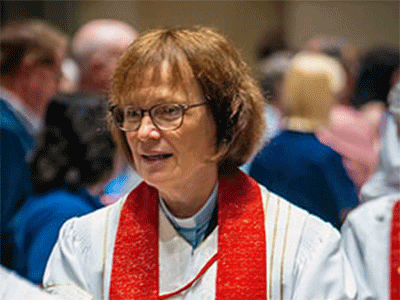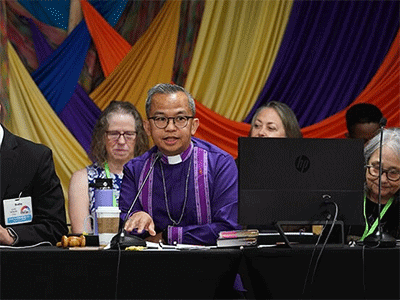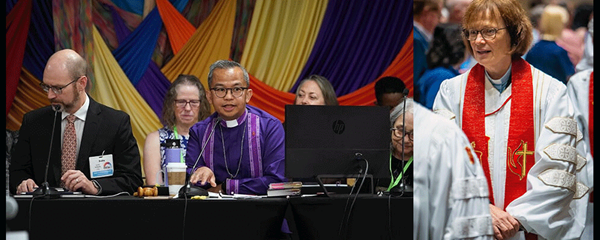What once seemed impenetrable boundaries on The United Methodist Church’s organizational map now look more like dotted lines.
Unprecedented collaboration among the denomination’s jurisdictional leaders has paved the way for two U.S. bishops to soon lead conferences across jurisdictional borders. Those assignments became official when jurisdictional conferences met July 10-13 across the U.S.
Your support of the Episcopal Fund apportionment helps pay the salaries and benefits of United Methodist Bishops and allows them to travel across their episcopal areas providing mentorship and leadership

Faced with a substantially reduced denominational budget, the committee worked with bishops and other United Methodist leaders across the U.S. to come up with a plan that would both reduce the number of U.S. bishops while still providing effective episcopal oversight across the U.S. church.
Starting Sept. 1, most U.S. bishops will lead more than one conference — the denomination’s primary regional bodies, which consist of multiple congregations.
Bishop Debra Wallace-Padgett will lead the Southeastern Jurisdiction’s Holston Conference and the Northeastern Jurisdiction’s West Virginia Conference. Bishop Carlo A. Rapanut will lead the Western Jurisdiction’s Desert Southwest Conference and the South Central Jurisdiction’s New Mexico Conference. The North Central Jurisdiction also got creative in its assignments, assigning two bishops to share duties in the Illinois Great Rivers Conference.
Council of Bishops President Tracy S. Malone is moving from leading the East Ohio Conference to the Indiana Conference starting Sept. 1.
The new assignments mean four of the five jurisdictions will share bishops across boundaries.
Still, questions remain about whether this development passes muster under the denomination’s constitution. The Northeastern Jurisdiction voted to request the Judicial Council to rule on legal questions related to the role of the Interjurisdictional Committee on Episcopacy and the assignments across jurisdictional lines. The church court will hold its next session in October.
Bishops have served in jurisdictions outside of where they were elected before. But usually they were on a special assignment or in an interim role assigned by the denomination’s Council of Bishops. Occasionally, bishops have transferred to another jurisdiction after they retired.
This appears to be the first time two bishops are leading episcopal areas that straddle jurisdictional lines. What makes this year’s bishop assignments especially historic is the monthslong cooperation among many non-bishop United Methodists that went into transcending jurisdictional lines.
The new assignments mean all but one jurisdiction is seeing a reduction in its bishops. The Western Jurisdiction remains at the minimum of five bishops required by the Discipline.
The jurisdiction also is the only one that held elections this year to replace retiring bishops — electing Bishops Kristin Stoneking and Sandra K. Olewine.

Rapanut will be returning to Desert Southwest, which encompasses Arizona and southern Nevada including Las Vegas, and is eager to also serve its neighbor New Mexico.
Wallace-Padgett, who has led both the North Alabama and Holston conferences, likewise is excited to take on her new, pioneering role.
She will be returning to Holston, which encompasses eastern Tennessee, a part of northern Georgia and southwestern Virginia where it borders West Virginia. Both Holston, which is celebrating its bicentennial, and West Virginia are in Appalachia — a good fit for Wallace-Padgett, who hails from Kentucky. She also said both conferences have been very welcoming.
The new assignment also meant adjusting the jurisdiction’s original plans for West Virginia and Western Pennsylvania to share a bishop.
The changes left many Northeastern Jurisdiction delegates with questions about what this new cross-jurisdictional assignment will mean.
excerpt from a story by Heather Hahn, assistant news editor, UM News.
One of seven apportioned giving opportunities of The United Methodist Church, the Episcopal Fund pays for bishops’ salaries, office and travel expenses, and pension and health-benefit coverage. Please encourage your leaders and congregations to support the Episcopal Fund apportionment at 100 percent.





